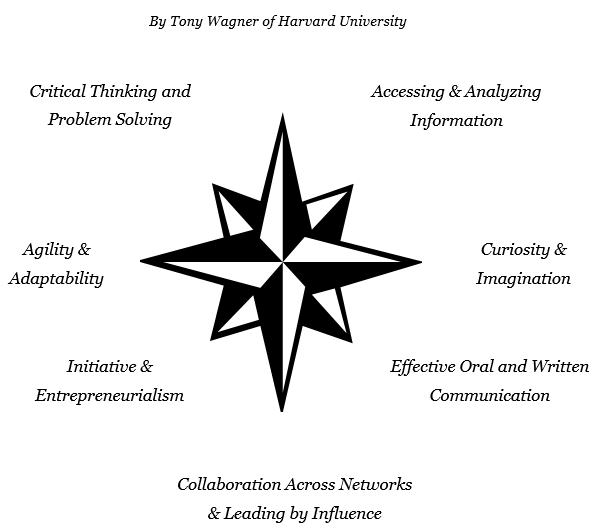7 Survival Skills for the 21st Century
|
From TonyWagner.com - to be edited to include examples of what this would like like in the curriculum.
CRITICAL THINKING AND PROBLEM SOLVING “The idea that a company’s senior leaders have all the answers and can solve problems by themselves has gone completely by the wayside…The person who’s close to the work has to have strong analytic skills. You have to be rigorous: test your assumptions, don’t take things at face value, don’t go in with preconceived ideas that you’re trying to prove.” —Ellen Kumata, consultant to Fortune 200 companies COLLABORATION ACROSS NETWORKS AND LEADING BY INFLUENCE “The biggest problem we have in the company as a whole is finding people capable of exerting leadership across the board…Our mantra is that you lead by influence, rather than authority.” —Mark Chandler, Senior Vice President and General Counsel at Cisco |
AGILITY AND ADAPTABILITY
“I’ve been here four years, and we’ve done fundamental reorganization every year because of changes in the business…I can guarantee the job I hire someone to do will change or may not exist in the future, so this is why adaptability and learning skills are more important than technical skills.”
—Clay Parker, President of Chemical Management Division of BOC Edwards
INITIATIVE AND ENTREPRENEURSHIP
“For our production and crafts staff, the hourly workers, we need self-directed people…who can find creative solutions to some very tough, challenging problems.”
—Mark Maddox, Human Resources Manager at Unilever Foods North America
EFFECTIVE ORAL AND WRITTEN COMMUNICATION
“The biggest skill people are missing is the ability to communicate: both written and oral presentations. It’s a huge problem for us.”
—Annmarie Neal, Vice President for Talent Management at Cisco Systems
ACCESSING AND ANALYZING INFORMATION
“There is so much information available that it is almost too much, and if people aren’t prepared to process the information effectively, it almost freezes them in their steps.”
—Mike Summers, Vice President for Global Talent Management at Dell
CURIOSITY AND IMAGINATION
“Our old idea is that work is defined by employers and that employees have to do whatever the employer wants…but actually, you would like him to come up with an interpretation that you like—he’s adding something personal—a creative element.”
—Michael Jung, Senior Consultant at McKinsey and Company
“I’ve been here four years, and we’ve done fundamental reorganization every year because of changes in the business…I can guarantee the job I hire someone to do will change or may not exist in the future, so this is why adaptability and learning skills are more important than technical skills.”
—Clay Parker, President of Chemical Management Division of BOC Edwards
INITIATIVE AND ENTREPRENEURSHIP
“For our production and crafts staff, the hourly workers, we need self-directed people…who can find creative solutions to some very tough, challenging problems.”
—Mark Maddox, Human Resources Manager at Unilever Foods North America
EFFECTIVE ORAL AND WRITTEN COMMUNICATION
“The biggest skill people are missing is the ability to communicate: both written and oral presentations. It’s a huge problem for us.”
—Annmarie Neal, Vice President for Talent Management at Cisco Systems
ACCESSING AND ANALYZING INFORMATION
“There is so much information available that it is almost too much, and if people aren’t prepared to process the information effectively, it almost freezes them in their steps.”
—Mike Summers, Vice President for Global Talent Management at Dell
CURIOSITY AND IMAGINATION
“Our old idea is that work is defined by employers and that employees have to do whatever the employer wants…but actually, you would like him to come up with an interpretation that you like—he’s adding something personal—a creative element.”
—Michael Jung, Senior Consultant at McKinsey and Company
